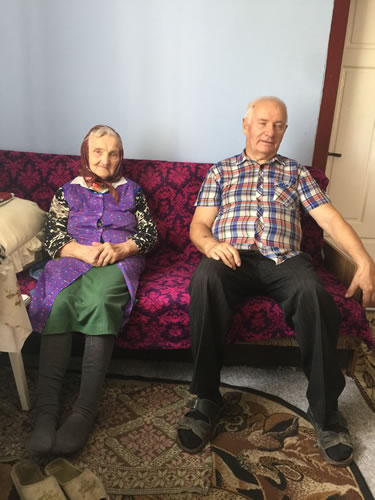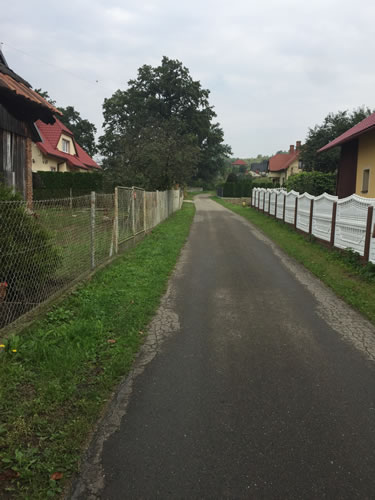Discovering Testimonies Off the Beaten Path: Three Women in Galicia
In September 2018, on a trip to Dynów, my grandmother’s home town in Galicia, my Dynower pal, Jurek Warchoł told me about three people he knew who had stories to tell about the Jewish people they lived with before the war.
Jurek, a rare English speaking Polish Galitzianer who I met on my first trip to my ancestral home town of Dynów in 2013, was always on the lookout for people who were alive before the war started, who may have stories to tell about the Jewish people in their towns, communities who made up such a large portion of the population and were therefore so significant a part of the normal everyday life until the Nazis invaded.
Jurek, as a good friend, had adopted my mission to help me reconstruct what my grandmother’s life was like, and perhaps what her life would have been like if not for the pogroms and then the Holocaust. These reconstructions are what I paint and what I write about. I am a history-portrait painter.
In this particular trip in 2018, Jurek had lined up for me to talk to three women, from different places, in and around Dynów, who were in their late 80s early 90s, who he thought might be ready to talk to me.
By the time of these interviews, I was no longer new at this, and I had left far behind any attitudes and preconceptions that too many people attribute to such conversations between Jewish young people searching for traces of their families and elderly Polish people who were part of the history – preconceptions about bystanders vs. upstanders, preconceptions and presumptions about collaboration, guilt or the absence of it, preconceptions about motives.
Rather, I learned that people’s stories are ongoing, both in real life and in memory, and that what I needed was simply to listen to what people say about that most terrible time, the Shoah.
The interviews were recorded and Karolina Koziura translated the complete oral testimonies.
#1—Interview with Mrs. Klara Szpiech at her home in Hłudno, which is in Galicia September 6, 2018
Klara Spziech was a 92-year-old woman who lived with her daughter-in-law, Danka, and her grandson, Milosz, who was about twelve years old, and busy with his action figurines while I was interviewing his grandmother.
Klara was energetic and friendly, outgoing and welcoming. She was interested in sharing what she remembered about the Tag family, her Jewish neighbors and playmates before the war. It was my connection with Michael Tag, a Holocaust survivor living in Boro Park, Brooklyn that brought me to have an interest in meeting Klara.
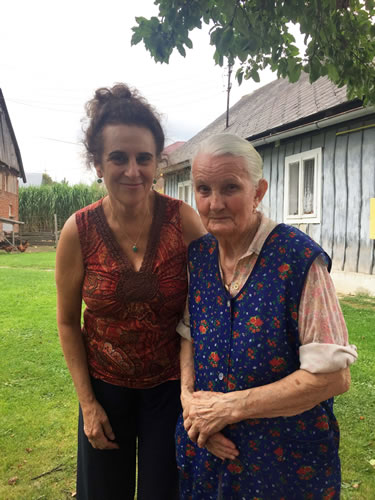
I had met Michael Tag from Hłudno in Brooklyn in summer 2017. He was 90 years old. He had survived numerous concentration camps in Poland. He arrived in the United States in 1949.
I therefore wanted to see if anyone in his town remembered him. My Dynower friend, Jurek Warchoł, led me to Hłudno, where we met Klara. Her home was reached via a dirt road, off the main road from Dynów. Hłudno is a village with hardly a store or a town center.
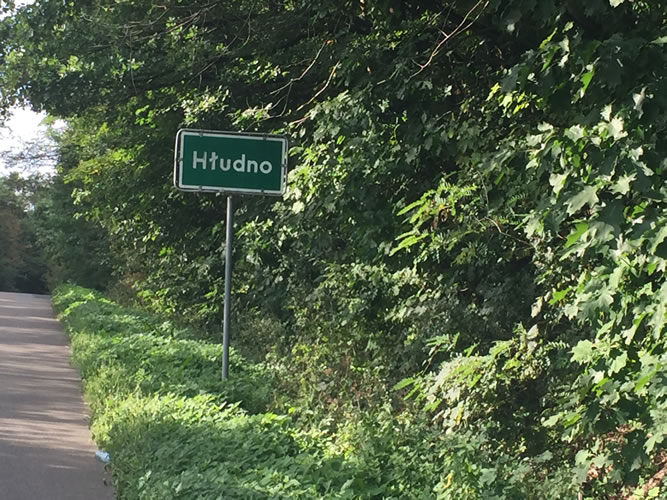
Mrs. Klara invited us to sit at a picnic table out in front of the family home. Her daughter-in-law served us pierogis and tea. (Did I mention that the pierogis were picture perfect and handmade)?
Memories from Before WWII
Nina: Do you remember the Tag family?
Mrs. Klara: The Tags were my neighbors. Their house was over there [she pointed across the road, to a spot about 25 yards away] right next to the barn. I was 10 years old when the war broke out and they were deported. But that old man [she was referring to Michael Tag’s grandfather] passed away by that time [Michael had told me in a previous interview that his grandfather was shot by a Nazi in front of his home]. I also remember the old grandmother, the father and Michael’s sister. They all died. When the sister was a little child I fed her with a roll. You know, people were very poor at that time, so for a child a roll was a goodie. His [Michael’s] name was Meilech and her [Michael’s sister’s] name was Regina [The Tag family called her Pesya]. [Klara is pointing towards the location of her current neighbor’s farm). Meilech’s father was Izaak. Oh, I played with his children so much...
N: Do you remember what happened when the Nazis came?
K: I remember everything when they took them. I also recall these bands that girls were trying to weave into their hair, [traditional head bands worn by Polish girls at the time, which also served to distinguish the Polish girls from the Jewish girls, which the Nazis used to identify the Jewish girls] so they won’t be taken. Their mother asked my mother to keep her little daughter so she wouldn’t be taken. Regina wanted to stay with us when the Nazis came, but we were so afraid. You see - here is the yard, here is our home and there was their home [again pointing to the proximity of their homes]. It was so close. And they said that they would kill everyone in the family up to the 14th generation if somebody keeps a Jewish person. My mom was so afraid. She said if we had lived behind the forest, they we would have kept her. Oh, these were such hard times.
N: Was anyone harmed from the Tag family during the war? Did the Nazis kill them?
K: The old couple and the young men were taken to forced labor by train. [According to Michael Tag, they were taken to the Jasienica Ghetto (in a town near Hłudno).
N: Did any of them survive?
K: I remember Meilech survived, and came back here after the war. He came here and even gave his family’s house to Karola Szpiech, the family’s housekeeper. Before the war, Jews and Poles respected each other, as we did. You know we lived with Jews as with the best neighbors. There were two Jewish families in Denisówka [a part of the village of Hłudno she refers to], namely Tag and Regiel, and there was a Jewish-owned inn and a grocery.
N: Michael’s sister was killed in the Jasienica Ghetto. What happened to the Szpiech woman that the house was given to?
K: Her name was Karola. Her family was from Wara village. Now Kazimierz, her son lives there. Now I am 90 years old and I never would have thought that I would see anyone who knew this family.
N: Here is a photo of Michael and his wife. Does he look familiar to you?
K: You know in the past it was hard to take a photo. I can’t tell.
N: Here is a photo when he was younger, and here’s a photo of his sister when she was in the ghetto in Jasienica.
K: It is hard to see, she has such strange clothes. People used to wear clothes like this in the past.
N: How long did the Nazis stay here? Do you remember any shooting?
K: No, there was no shooting. They would just take people with them for forced labor. Later, they would try to catch people around the village. They took our priest, our teacher. In the case of the teacher, they tied his hands with a rope and threw him in a truck. Oh, it is so hard to explain what we lived through. There was such a hunger, and we had no clothes, no shoes.
My uncle Basili was my grandfather’s brother, and he married a Jewish woman. His family writes to me often. When there was a Jewish inn here, Basili would go there and buy cigarettes, and he met the innkeeper’s 16-year-old daughter. My uncle baptized her and married her later. Her name used to be Salcia but then she changed it to Maria. It was in the village of Stara Wieś. My uncle was working as a driver in the landlord’s estate.
Jurek: So Basili and Maria got married?
K: Yes, and they had 7 children. One day he went to the Jewish inn to buy cigarettes but he didn’t return home. Next morning, he was found on the riverbank drowned with his head in the water. We were told that locals who didn’t like that he married a Jewish woman killed him. All his children emigrated to the United States before the war.
My mom became a widow when she was 24 years old and she survived only because of the Jews. My mother was 17 years old when she got married. My father Denis was killed in Borysław, where he worked in an oil factory, after he was found having an affair with a Jewish woman. I was born in February and he was killed two weeks later. It was so long ago. You know, Jews came here a long time ago and they got land here. When my father married my mom, he went to Borysław to prepare all the documents regarding the land he bought here. And my mom was cleaning at the house of a Jewish family.
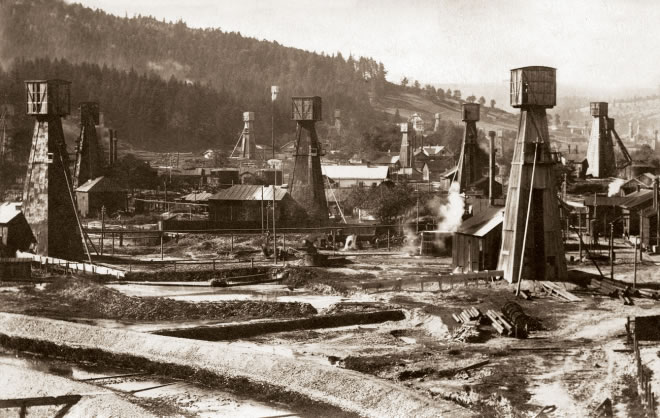
J: Where did you live back then?
K: We lived in Denisówka for 19 years. There is still a basement there but the inn burned down. The inn was located closer to us.
J: Did your mom remarry?
K: Yes, six years later. She married another bachelor but her life wasn’t easy. I was 6 years old when he went to war.
J: How many children did your mother and father have?
K: Two. I had a sister who was 5 years older than me. My mother got sick after her first husband was killed.
J: Did your mother have children with her second husband?
K: She didn’t. My mother was born in 1905 and he was born in 1909. But, her first husband, Denis, was 9 years older than my mom. She used to tell me that when he came to propose, she started crying. She was just 17 years old. But what was she supposed to do? She needed to get married. By that time, he owned many fields. My sister passed away. She had also 6 children.
J: Do you still cook?
K: Yes, sometimes soups but not pierogis. My fingers are not good enough.
Mrs. Danka (Klara’s daughter-in-law): Here is my son, Milosz. He is 12 years old.
J: Milosz! Introduce yourself. Don’t be shy. He is a good boy.
K: I have 17 grandchildren and 2 great-grandchildren. I am a widow for 17 years.
J: Where does your husband work?
Mrs. D: He works as a miner in Silesia seasonally.
J: I remember him. Later he used to work in Dynów. He was responsible for central heating. [Now, he talks to Milosz] So how are you at school? Do you have a computer? Or maybe you like to play games?
Mrs. D: He likes to play a farmer.
J: She [pointing to Nina] had a family in Dynów and in Wara. Her family had a butcher store. In Wara her Spinrad family used to live. Mrs. Klara, did you go to school?
K: Yes, here in Hłudno, but when the war broke out, the school was closed. During the war I was forced to work in the landlord’s estate. I was supposed to be taken to Germany but I was too young. I was just given food, like wheat and barley — about 10 kilos per month. I also got some small money, but we were so poor. We had nothing to wear…oh, I don’t even want to recall this. We had a small lamp but we needed to cover our windows so nobody could see it. Oh, I just pray that such a bad time would never return. Once, my cousin from the United States came with his German wife and she asked about our life during the war. What could I say? It was hard — just that.
#2—Franciszka Łukasz testimony, September 7, 2018, Dynów, Poland
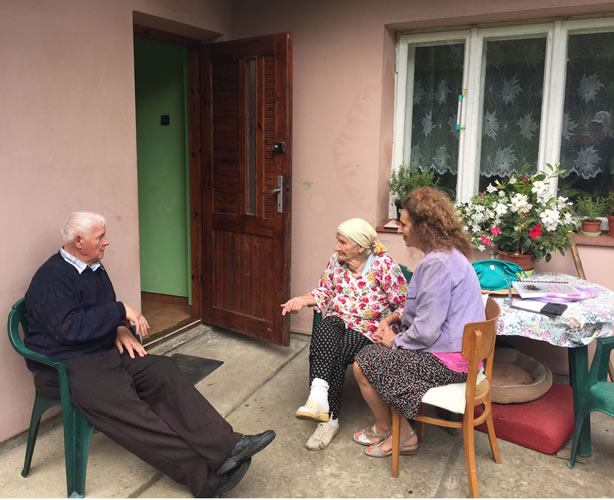
I was told about Franciszka at an opening for my art exhibition, Faces of Dynów, held in Zamosc in December 2016. A man in the audience was questioning me, testing me it seemed, about my actual knowledge of Dynów. It turned out that this man was born and raised in Dynów. His name was Alexander Łukasz, and that his mother still lived in Dynow.
Alexander agreed to my meeting his mother Franciszka but he emphasized that she was old, frail and with poor memory. When I met her in person, I could see how far off Alexander was in his assessment of his mother. (Obviously, he did not go to visit his mother often enough).
In fact, Franciszka was a sturdy, vibrant, rosy cheeked and optimistic 94 year-old, who would not ease up on her strong grip of my hand throughout our hour and a half long interview. When I got up to leave, she quickly grabbed my arm, pushed me back in the chair and eagerly told me she was not done with this visit, which we all really enjoyed.
Franciszka lives independently in a farmhouse outside of Dynów. She spends nice days sitting in her yard, surrounded by an apple orchard. She does her own cooking, cleaning and laundry. Hiding a Jewish Man in the Forest
My interview with Franciszka focused on her experiences from the time the Nazis invaded Dynów and the surrounding area in September 1939 until the end of World War II.
Franciszka: My mom was hiding a Jew in the forest. From time to time, I was visiting him with my mom. We had our field close to the forest, and my mother would take me to visit him so nobody would suspect anything. I am from Ulanica and this man was also from Ulanica. He was a very good man, and my mom took care of him. He had a daughter the same age as me, and we had gone to school together.
Jurek: Do you remember his name?
F: His name was Moshe. Only I knew about my mother and this place when she was hiding him. For this, she could get a death sentence if somebody saw that we were taking food there. It was eight of us in the family and my mom chose only me to accompany her. Even the priest asked who had buried this Jewish man in the forest. He was alone in this forest…I don’t know where his family was at that time.
J: But why did he die?
F: He passed away in this forest because the poor man would eat only once a day…he was sitting next to the tree all the time. It was such a horrible experience.
J: Where was this forest?
Franciszka’s Family Trajectory and Neighbors
F: In Ulanica where we lived. And then, I went to look for a job in Dynów, where I lived up the hill next to the Jewish bathhouse.
J: How long have you lived in this house where we are sitting?
F: I came here in 1946 when I got married. There was nothing here —everything was burnt down. When the Germans were withdrawing from Russia in 1944, they would set fire everywhere here. Everything was destroyed but the chimney. It used to be a farm here before the war. A barn and a stable used to be here too but it was also burned down.
J: During the war you lived with the Kostur family?
F: Yes, Kostur used to work in the post office. I knew his son very well. And who lives there right now?
J: Kosturówa’s daughter lives there. You lived there alone? Where was your mother? Did you know any Jews from Dynów?
F: My mother stayed in Ulanica. The whole German period I used to work in Dynów. At that time, there were no Jews in Dynów. By 1940 there was nobody—they killed everyone.
J: In which month did you move to Dynów?
F: In January. I was so curious about everything. But, there was nothing about Jews. Germans would take this person to Auschwitz, that person to Auschwitz. I was 17 years old and I knew almost everyone. Antek Potoczny used to live in this huge house on the corner, and I worked in his field.
J: Did you know the Misar family from Lvov? The man used to work in the butchery, and in the 1960s he would sell sausages in Dynów.
F: The oldest one from the family was a manager in the bakery and the other one was working in the butchery.
J: Did you know the Julek Drozd family that lived down by the bathhouse? They established a high school in Dynów later. Mr. Laufer, a Jewish man lived in the green house on the Łazienna Street.
F: Yes, Laufer I remember. He had three cows.
J: I used to live close. And then Romek Adam bought the house.
F: I was going to Laufer to grind the grain in the barn. The grindstone was destroyed but people tried to put it together. And then one German came and heard the grinding and… oh they would do such horrible things, not only to Jews but also to Poles. You know at 4PM the police hour would start. Nobody could walk on the street. So, I was going there to grind the grain at night.
J: There were no Jews when you moved to Dynów?
F: Right, I came in January 1940 and there were no Jews left.
J: And when was this very harsh winter? Was it in that year or the next one?
F: There was a hungry year in 1942. Germans would give only cards, which you could exchange for food. Kostur who worked in the post office he would get some bread…and you know how bad was this bread? Klimek Krasopolski had a bakery. He had two sons and a daughter. You should know his daughter - she married Gasecki.
J: Yes I know her.
F: Yes, this is the one. Her parents had a bakery.
J: It was close to Łazienna Street—I think building No. 1 on the same side as the bathhouse.
F: Yes, but next to the bathhouse was also the house of Drelinkiewicz and Denisiewicz.
J: What about the house on the opposite site to the bathhouse? Her [Nina’s] grandmother used to live there. So, there was one more house there - next to Derynkiewicz.
F: Kędzierski used to live there, right? Well, there was a white house there…and then Kędzierski left for Przemyśl. So, I knew these places. I also know where the Dzwigaj family used to live.
J: What about Gliwecki, the shoemaker?
F: Oh yes, he created such nice shoes with stripes for me. I knew so many streets in Dynów.
J: Yes, but when the Russians came they took Ulaniecki to Siberia. It was in 1944 when they took many men from Dynów.
F: He created the shoes for me during the winter. You don’t know this because you were born after the war, but there was a flood in Dynów in 1941 and in 1942 was the famine.
J: Where did you go to school?
F: In Ulanica, there were four grades there. But, I was working 10 years in Dynów in the student house of the vocational school. This building belonged to Jews before the war. They had a grain warehouse there.
J: The Zdzichu hotel is there. You worked there during the war?
F: No, I started my work in 1978.
J: Marysia Lozowa used to work there. Did you know her? My mom also used to work there. She worked with Marysia Lozowa and with Mrs. Halinka. Did you know them?
F: Yes, I did. I started my work there later. I liked this work a lot, as it was close to everything —the church, the market square and the shops.
J: What did you do there? Do you remember any stores in Dynów before the war?
F: I was cleaning. I was a bit older than the rest. Our manager was very good - even now we talk and we sometimes meet. I invite him for apples sometimes. I also remember one thing about the Jews before the war. I was walking with my mom and they were selling some goods on the sidewalk. A Jewish woman said to my mother, “Dytkówa buy something for your daughter.” And my mom replied, “I don’t have money.” The Jewish women insisted, “Well, I can still give you something and you will just pay me back one day.” My mom did not take it — she didn’t have money to pay for it. And then the war started couple of days later. And, yes, there were these stores downtown with apartments above.
J: There was a Jewish man, Grossman. He had a bakery, do you remember?
F: Yes, he had a bakery on the market.
J: And what about Krasnopolski? A Pole? He had another bakery?
F: Yes, yes.
J: But next to this Jewish bakery, her [Nina’s] family had a butcher shop— the Neger family.
F: When the Germans came they destroyed everything. The butcher shop was destroyed, and the Poles who used to work there took the bakery. Until that moment the Germans did not close this shop, and I would take dough in a bucket to bake a cake there.
J: When you were little did you go to stores to Dynów? Do you remember any butcher shops?
F: No, I don’t remember. My mom didn’t have money. You know, before the war people had not been working, they had no money but they had to pay taxes. These were very poor people. People would have their own grain or farm animals and Jewish cattle dealers would buy something. Everything was sold on the market and this was good.
J: And the market was open before the war?
F: Yes.
J: Her [Nina’s] uncle used to sell everything on the market before the war - not only meat. His name was Mendel Neger. She [Nina] will bring photos.
F: Do you know the case when a Jewish man tried to hide next to the synagogue, and Germans came and they executed the entire family? My mom used to say that nobody would help us but Jews. The Jewish man Moishe that my mother helped was a very poor man. He was passing from home to home with a basket.
F: [looking at the photos] Such nice photos [laughing and then looking at the photos in silence]. I don’t remember this green house [pointing to a photo of the house in which Nina’s great-great-grandmother, Chaya Spinrad, had lived].
J: Can you see without glasses? It might be hard. This is the man from their [Nina] family. He was trading on the market.
F: Sure, I can see without glasses. Jews were selling so many products at the market, and they also would sell their things on the sidewalk.
J: This was her family Neger- Mendel Neger, and this one is her [Nina’s] great grandfather Abraham Neger. He used to live on Łazienna Street.
J: Before the war, you worked in Lvov for two years from 1937 until 1939, right?
F: Yes, before the war I worked in Lvov.[Now Jurek is explaining the life story of Mrs. Franciszka. She used to work in Lvov as a cleaning lady from 1937 until 1939. Then she returned to her mother in Ulanica. In January 1940 she moved to Dynów. She couldn’t move to another place - she didn’t know anybody in Rzeszów or in any other place. In Dynów, she could get a job and support her family.]
J: Nina and her husband wonder why you are laughing all the time? Are you always like this, or maybe you enjoy the company?
F: I am always happy, because I think everything is all right now. Before and during the war were horrible times. The Jews used to come to us, their children were sick, coughing all the time, and often would die.
Russian Soldiers in Dynów During the Second World War
J: Did the Russian soldiers burn down houses at that time? Did they take the men to Russia?
F: Yes, but it was later and they burnt down houses on the [Dynów] market square, and there were two women who they forced into a truck. This was in spring and they took men in summer. First they took them to Sanok. It was such a mess. It was in 1945, all the women were crying because they took their men to the school No. 1 [the building now used by the Dynów town administration]. Then they took one man from that first house over there. He was trying to escape but they shot at him…he was crawling. I heard him dying.
Another man was also shot by the Russians. He was hiding in the cellar I keep outside. I saw it—he was trying to escape to the forest and there a Russian soldier shot him.
J: Did you see when Germans were shooting Jews?
F: No, I didn’t see it, but I heard about it because I was in Ulanica. People would come and tell the stories about Germans’ actions. I was young and we were scared so much. We didn’t even want to know. From my home, nobody went there to watch but we were all crying about what was happening. The Nazis just came, and nobody supported them, nobody opposed them…they just drove on their motorcycles and cars. My father served in the army in the First World War and he always told us stories of what happened, so, he was always repeating about people who went to see what was going on, “Why are you are going there?” The Nazis killed everyone, and some people were escaping on cartload from Tarnów and Gorlice. They talked about it. We were all crying…my father was repeating that these are all people, why are the Germans doing this?
J: What did people say about Jews being killed in Dynów? F: Nobody went there.
J: Yes, but what did they say about how the Jews were killed?
F: They were shot. Oh this was so horrible. People would come to our home and tell the stories but it was so terrifying. It was so horrifying to hear what happened in the synagogue. People said that the rabbi was thrown into the fire, and later people would repeat, “Don’t go anywhere because Nazis could catch you and take you to labor camps in Germany.”
J: What about when you were visiting Dynów before the war with your mother? Do you remember the synagogue? Did you come to Dynów for church?
F: When I was going there with my mother everything was still all right. We didn’t go to the synagogue— it was the one on the hill, yes? There were one or three synagogues? We didn’t have a need to go to the synagogue. We would just go to the market square to walk a bit and buy something, but we didn’t have money. We did go to the church in Dynów, but it was a mess in the Catholic Church as people needed to run back home because of the police hour [curfew]. We had a wooden church in Ulanica as well but they burned it down after the war.
J: Your husband passed away?
F: Oh yes a long time ago, he passed away in 1981. He was 73 years old.
J: And when were you born?
F: I was born in 1922. I am 96 years old.
J: My father was also born in 1922. But it has been 20 years since my father passed away. Your surname is Łukasz?
F: Yes, Franciszka Łukasz.
J: Have you ever travelled abroad?
F: Yes, I was in Lvov two times. That city used to be so beautiful before the war before it was destroyed. I was so curious about everything there. I wanted to know where everything was. I knew all the streets: Kopernika, Stryjska…but now everything is in Russian. I knew all the Polish monuments, now Russian replaces everything. There were forty-two Catholic churches in Lvov but now they left only three. [It is hard to say what Mrs. Franciszka means by “now” and unclear whether she visited L’viv during the Soviet period or afterwards—translator’s note].
J: What about Drozd family? There was a woman there whose husband Piotrek used to play on drums.
F: I remember because there were only three clerks in Dynów and the one on drums would play before any public announcements. We had a mayor and secretary and this man playing on drums.
J: Did Mr. Piotrek, the drummer play on drums during the war? What was the name of the mayor during the war?
F: I think it was the same drummer, and maybe the mayor then was Wandasiewicz? I know that Wandasiewicz issued us a marriage license, but it was after the war in 1946.
During the war a lot of people were taken away. These were horrible times. There was the flood, the starvation. The border was here —on the one side were Russians and on the other Germans. There was no place to go.
#3 — Irena Brunek, 98, and the Brunek Family, Dubiecko, September 8, 2018
A visit to Dynów must include a stop in Dubiecko, for several reasons. First, Dubiecko is Dynów’s sister city. It was also a place of refuge for Jews fleeing Dynów when the Nazis invaded on September 15, 1939. In addition my friend Bernice B. and her cousin’s family are from there. The two cousins raised the funds to construct and install a memorial for the murdered Jews in the center of Dubiecko in 2007.
Our friend Jurek, on September 8, 2018, took us to meet a 98-year-old Polish woman, Irena Brunek, who lived in Dubiecko, with her son Mr. Brunek. Irena had horrible memories of the German invasion in her town. Irena was born in 1920, and she witnessed scenes of the Nazi invasion there in September 1939. She was 19 years old at the time.
Before our interview of Irina, Mr. Brunek took us on a walk through town to see the Jewish landmarks. Dubiecko is about 8 miles from Dynów.
Walking along the outside of the Jewish Cemetery
Mr. Brunek: A religious man put a cross here but there was a storm and destroyed that cross, so he brought another cross and put here on this tree. That guy passed away four years ago.
Nina: He put it to commemorate the cemetery?
Jurek: Yes, to commemorate the Jews that were killed in Dubiecko. Moish Rand (Nina’s husband): He put many crosses or just one on this street?
J: Yes, he put shrines in many places in town.
B: The cemetery here was very big, and there were additional two prayer houses here.
M: Were they in the same place, or close to each other?
B: I will show you where, but there is nothing left there any more.
J: Mr. Brunek, how was it when the Nazis were shooting the Jews in Dubiecko?
B: The Nazis shot the Jews one after another. They put them in a very long line and told them to raise their arms.
J: Where was it?
B: At the cemetery. There is a mass grave there. After the war, these people from a Jewish organization came from Kraków, dug up all the bones, transported them to a cemetery there, and they put up a memorial board. There were just bones because the Nazis would put lime on them so the bodies would disappear faster.
J: Where were they were shot? What were the details? Did people see these actions?
B: They were shot at the cemetery. They were waiting in line. The Nazis would take five people and shoot them. After them they would do the same with the next group…until they would kill everybody. There was one neighbor down there and she saw everything. Two days after the killings the ground on this grave would still be moving.
J: Those people standing in line would see what was happening?
M: In other places, they would put the people in line and force them to stand behind the hill so they would not see anything. They could hear it but they didn’t see anything.
They would also see the earth moving form a long time…you know like in Babi Yar - the ground would move from the heat from the bodies.
B: Buildings here are original from Jewish times. A Jewish family lived in this grey building by the road, and those two buildings as well. The brick house was once wooden and it also belonged to Jews.
Walking Into the Town Center
B: My mother would buy shoes here and a Jewish family also lived here in this house. The Gestapo took over the building and set its headquarters here. Now, the building is green but it used to be brown. And in these two windows there was a prayer house, you know for Sukkoth. Nobody lived here. The windows were much smaller then.
Only five years ago, the local community would regulate the ownership issue. Before it belonged to Jewish community.
J: “Galicja” is a new building constructed after the war [Name of community center in town center].
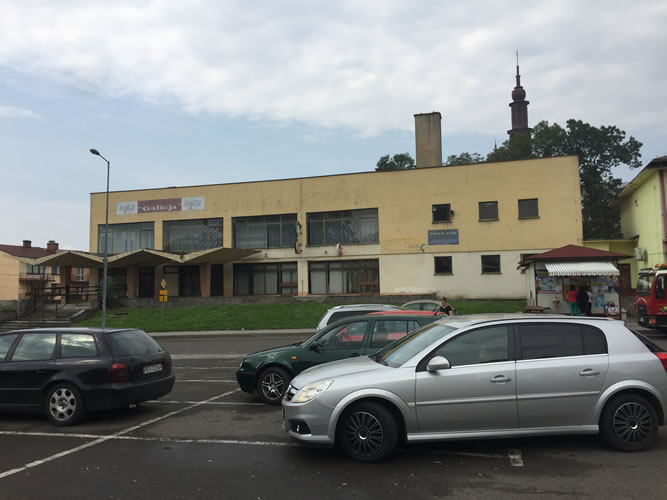
B: This building was also constructed before the war. The roof is still original. Everything here looked a little bit different. All the houses had arcades so the horses could drive through. There were many restaurants there.
We meet a woman outside the location of the bathhouse – she tells us that her grandfather worked in the Jewish bathhouse.J: Who worked in this bathhouse?
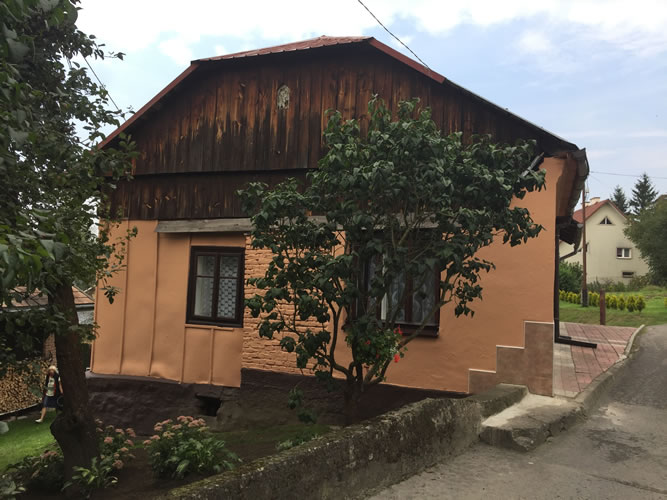
Woman: My grandfather worked here. Our family was the only non-Jewish one that could take a bath there—nobody else. They were in very good relations.
J: Your grandfather was Jewish?
Woman: No. He just worked there.
J: So, your grandfather lived here [pointing to a nearby house], and where was the bath? Is there anything left from the bath?
Woman: The bath was down there. The building is no longer here. Everything was destroyed here. Nothing is left. There were some stones but the Nazis destroyed everything during the bombings. I know that down there where the Orthodox Church is located was a Jewish pharmacy. You know next to the Ukrainian Church, where Zurawski lives. They were shot. My mother would tell us that they were very good people. You could get medicines there at any time during the night. People used to have very good relations here with each other. My uncle befriended one of them who worked at the pharmacy, and later they would visit each other in Kraków.
J: Do you like to live here?
Woman: Yes, I like this place. My grandmother would repeat constantly how good this place had been before the war.
J: Do you remember your grandfather? Did he survive the war?
Woman: No, I don’t remember him, and he did survive the war. But he was also running from the war. He just took his cow and escaped to Śliwnica. Everything was bombed here. In the past, people would visit each other in the evening and tell stories of how all these places looked like earlier. Staszkiewicz, Botnicka lived here. Every second house was Jewish. The Polish judge used to live here. His name was Prusyk. A court used to be in the same place as where the school is located now. I have a cousin in New York. I don’t know exactly where he lives. We can’t afford to visit him. One of his daughters lives in Texas.
J: Who told you the stories about these places- your mother?
Woman: Yes, my mother and my grandmother. My mom had a friend who got married in Warsaw. I think her name was Zyta Curych. They would visit this place where the painter shop is located. She even wanted to take me to Warsaw to study there but my mother would not let me.
Back at the Brunek House
J: Mrs. Stanisława Brunek is 98 years old. Can we ask you [Mr. Brunek] about your mother’s memories from the war?
B: She was born in January 1921. What can be said? They were such poor people, and such difficult times. Her family used to live in the mountains.
J: You didn’t visit Dynów at that time? Maybe for shopping?
B: She would visit the church in Dubiecko. She would walk 13 kilometers to the church.
J: Probably that is why you are so healthy now.
Mrs. Brunek: Yes, my doctor told me once that I have lived for so long because I used to be slim and work physically all my life.
J: Did you have any contact with the local Jewish community? p class="answer">Mrs. B: Yes, with my mother we would buy everything from the Jewish shopkeepers. They would stand in front of shops and invite everyone inside whether you had money or not.
J: Maybe, it is better not to ask her too many questions…? Where did you go to school?
B: She went to school in Jawornik Polski. It is far away from here. She finished only three classes.
Mrs. B: It was hard to get there. When it was snowing, we needed to stay at home. There were many children attending school - sometimes 10 from one family. It was so hard to get to the school while it was snowing. I needed to walk 6 kilometers so when I returned home my legs were all red and swollen, so when it was snowing, we would stay at home.
M: When was the best time of your life?
Mrs. B: It was never good. There was never enough bread, enough food. Children were hungry. I had an uncle in Rzeszów (my mother’s brother) that I used to visit as he arranged a job for me there. I was earning one złoty per day and 6 złoty per week. It was so much money for me. I would bring money home and my mother would cry. I worked from dawn to dusk.
B: It was 55 kilometers from her home.
Recalling Nazis in Dubiecko
Mrs. B: Once, I was walking to my uncle and the war had already started. I saw the German troops stationing by the road. They were cooking and washing their clothes. I was walking and the young soldiers called out to me. The smell of their cooking was so delicious, and I was so hungry. They wanted to give me food, but I refused because I thought they wanted to poison me. At home my family told me not to take anything from them.
J: She was 18 years old at that time.
Mrs. B: They were very upset that I didn’t want to take food, so they got on their motorcycles and drove after me laughing all the time. They would follow me to Rzeszów. I entered my uncle’s house and they would enter after me. My uncle, who knew a little bit of German started to talk with them. He just told me to go sleep. You know, Germans were everywhere…in every village. If they wanted to go somewhere, Polish farmers would need to take them. You know, they would never enter the forest by themselves.
Translation of the complete oral testimony by Karolina Koziura.
Edited by Mark Rand.
